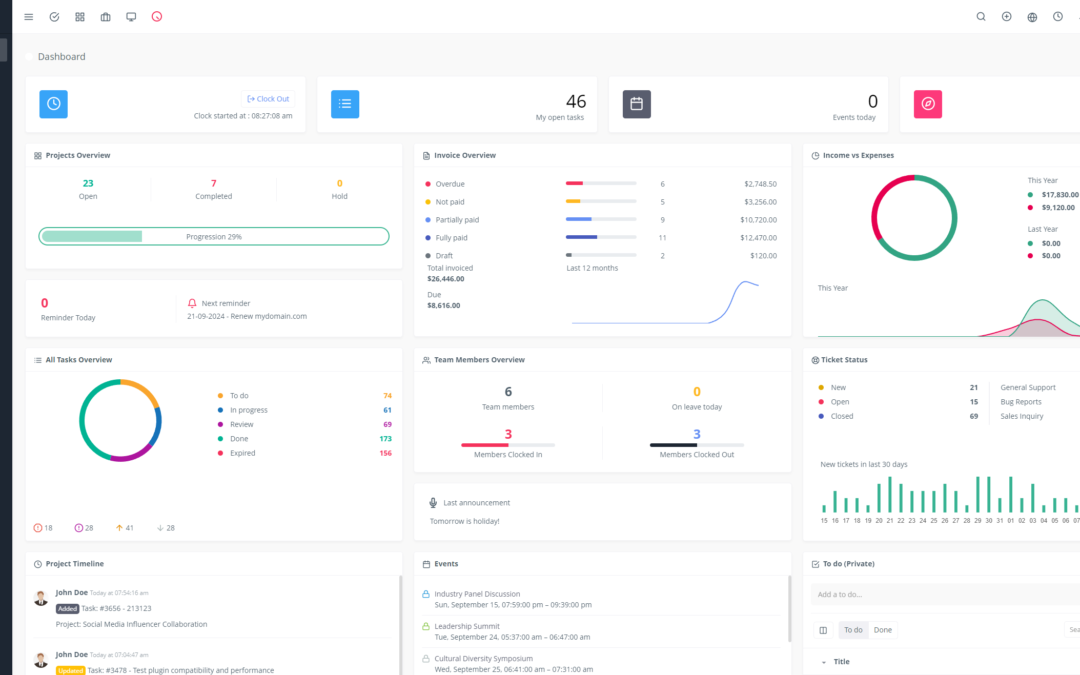The CRM SaaS market is experiencing rapid growth, fueled by emerging technologies and a growing demand for powerful solutions to enhance the customer experience. Here are the key trends shaping the future of CRM:
1. Artificial Intelligence and Machine Learning at the Heart of CRM 🤖
AI and machine learning are revolutionizing the way businesses interact with their customers. CRMs now integrate features for predictive analytics, automated segmentation, personalized offers, and intelligent recommendations. These technologies automate complex tasks, improve forecasting accuracy, and deliver more personalized customer experiences.
2. Increased Integration with Other SaaS Tools 🧩
CRMs are evolving into open and connected platforms, seamlessly integrating with other SaaS tools such as marketing automation platforms, data analytics tools, sales management systems, and communication platforms. This integration creates a unified ecosystem for better data management and more efficient collaboration.
3. Growing Adoption of Cloud-Based CRM Platforms ☁️
Cloud-based CRM platforms offer businesses greater flexibility, improved accessibility, and reduced infrastructure costs. They also allow for constant updates and increased scalability to meet the changing needs of businesses.
4. Focus on Customer Experience and Personalization 🎯
Customer experience has become central to business strategy. CRMs integrate features to personalize customer interactions, deliver unique experiences, and enhance overall satisfaction.
5. Increased Automation of Sales and Marketing Processes ⚙️
Automating sales and marketing processes saves time and optimizes team productivity. CRMs integrate features to automate repetitive tasks, marketing campaigns, and customer follow-ups, allowing teams to focus on higher-value activities.
6. Development of Industry-Specific CRM Solutions 🏗️
The CRM market is seeing the emergence of solutions specific to certain industries, meeting the unique needs of each sector. These solutions offer features and tools tailored to the challenges and opportunities specific to each field.
7. Growing Importance of Data and Analytics 📊
Data is the fuel of modern CRM. Businesses use data analytics tools to better understand customer behavior, identify trends, and improve their loyalty strategies.
8. Focus on Mobility and Real-Time Data Access 📱
CRM needs to be accessible anywhere, anytime. Mobile platforms allow teams to access customer information and interact with them, even on the go.
9. Increased Data Security and Privacy 🔐
Data security and privacy have become top priorities. CRMs integrate enhanced security features to protect sensitive information and ensure compliance with data protection regulations.
10. Adoption of Virtual Reality and Augmented Reality 👓️
Virtual reality and augmented reality are opening new perspectives for the customer experience. CRMs are integrating these technologies to offer virtual product tours, immersive demonstrations, and more engaging customer interactions.
11. Integration of Social Media into CRM Strategies 💬
Social media has become an essential communication channel for businesses. CRMs integrate features to manage businesses’ social media presence, track customer conversations, and respond to requests.
12. Use of Blockchain for Data Management ⛓️
Blockchain allows for secure and traceable customer data, ensuring its integrity and transparency. CRMs are integrating blockchain to improve information security and data management.
13. Development of Sustainable CRM Solutions 🌎
Businesses are increasingly committed to sustainable development. CRMs are integrating features to measure the environmental impact of business activities and offer more sustainable solutions.
14. Increased Importance of Data and Predictive Analytics 🔮
Predictive analytics allows businesses to anticipate customer needs and behaviors. CRMs integrate predictive analytics features to improve decision-making and optimize marketing and sales strategies.
15. User-Centric Approach and Experience 🧑🤝🧑
User experience is at the heart of CRM development. Platforms are designed to be intuitive, easy to use, and provide a seamless and personalized experience.
16. Development of CRM Solutions for Small and Medium-Sized Businesses 🏢
CRMs are adapting to the specific needs of small and medium-sized businesses, offering affordable and easy-to-implement solutions.
17. Integration of Chatbots and Virtual Assistants 🤖
Chatbots and virtual assistants automate customer interactions and provide immediate assistance. CRMs are integrating these technologies to improve customer service quality and customer satisfaction.
18. Adoption of the Internet of Things (IoT) 📡
The IoT opens new perspectives for collecting and analyzing customer data. CRMs integrate features to collect data from sensors and connected devices, allowing for a better understanding of customer needs and habits.
19. Development of CRM Solutions for Managing Multi-Channel Customer Relationships 🌐
Customers interact with businesses through numerous channels. CRMs integrate features to manage customer interactions across all channels, ensuring a unified and consistent customer experience.
20. Emergence of New Pricing and Subscription Models 💰
The CRM market is seeing the emergence of new pricing and subscription models, offering greater flexibility and better adaptability to business needs.
In conclusion, the CRM SaaS market is constantly evolving, offering businesses new opportunities to improve customer relationship management, optimize processes, and build customer loyalty. By leveraging technological innovations and adapting their strategies, businesses can maximize their potential and thrive in a constantly changing digital world. 🎉

